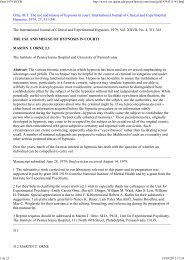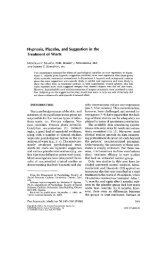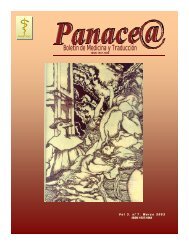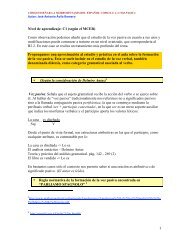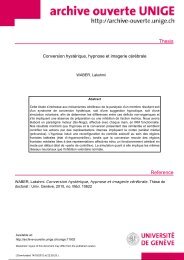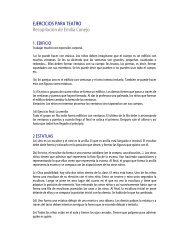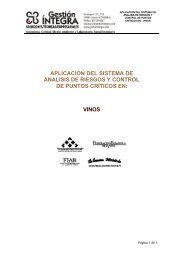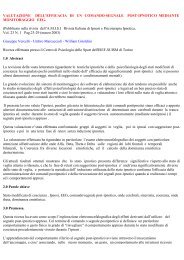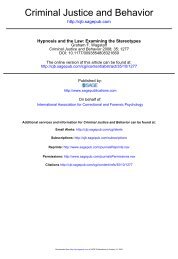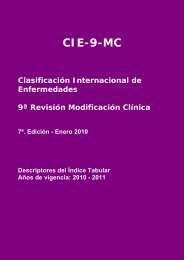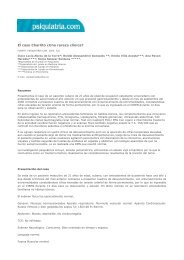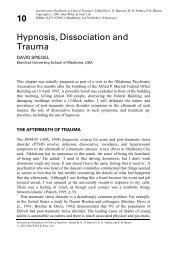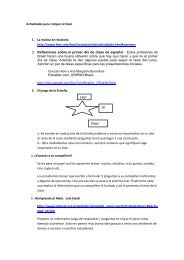Diccionario etimológico comparado de la lengua castellana
Diccionario etimológico comparado de la lengua castellana
Diccionario etimológico comparado de la lengua castellana
Create successful ePaper yourself
Turn your PDF publications into a flip-book with our unique Google optimized e-Paper software.
SIGN.<br />
—<br />
FEBRI FECUN 2575<br />
Med. calenturirnto :<br />
Y ansí no osamos dar<strong>la</strong>s á loa febricitantes. Lag.<br />
Dlosc. lib. 1.<br />
Febri-do, da. adj.<br />
Gfr. etim. fadrido.<br />
SIGN.— ant. Bruñido, resp<strong>la</strong>n<strong>de</strong>ciente:<br />
Quarenta caballeros armados <strong>de</strong> arneses fabridos. 13.<br />
Ciud. B. Epist. 16.<br />
Febrí-fug-o, a. adj.<br />
Gfr. etim. febricitante.<br />
SIGN. Mcd. 'Que<br />
más particu<strong>la</strong>rmente<br />
quita <strong>la</strong>s calenturas, y<br />
<strong>la</strong>s intermitentes. Ú. t.<br />
c. s. m.<br />
Febr-il. adj.<br />
Gfr. etim. fiebre. Suf. -//.<br />
SIGN.—1. Perteneciente á <strong>la</strong> fiebre:<br />
Échase en los brebages como harina y bébese contra<br />
los paroxismos febriles. Lcug. Diosc. lib. 2, cap. 143.<br />
2. fig. Ardoroso, <strong>de</strong>sasosegado, violento. Inpaciencia,<br />
actividad, febril.<br />
Febroni-ano, ana. adj.<br />
ETIM. -De Justinus Febronius, pseudónimo<br />
<strong>de</strong> Juan Nicolás Hontheim. canonista<br />
alemán que fundó <strong>la</strong> escue<strong>la</strong> y<br />
doctrina que lleva su nombre. Derívase<br />
febr-onius <strong>de</strong> fe-bru-us^ que j)urifica,<br />
limpia <strong>la</strong> doctrina re<strong>la</strong>tiva á los <strong>de</strong>rechos<br />
<strong>de</strong> <strong>la</strong> potestad pontificia; purificador<br />
<strong>de</strong> los errores, etc.; cuya etim. cfr.<br />
en FEBR-ERO. De fe-bru-us formóse Febr-onius,<br />
mediante el suf. -onius (cfr.<br />
-onio). Cfr. FERVOR, hervir, etc.<br />
SIGN.— Perteneciente á <strong>la</strong> doctrina y escue<strong>la</strong><br />
<strong>de</strong> Febronio (Juan Nicolás Hontheim),<br />
canonista alemán <strong>de</strong>l siglo xviii, que rebajaba<br />
los <strong>de</strong>rechos <strong>de</strong> <strong>la</strong> potestad pontificia y exaltaba<br />
cismáticamente <strong>la</strong> autoridad <strong>de</strong> los obispos.<br />
Fec-al. adj.<br />
ETIM.— Del <strong>la</strong>t. faex, faec-is, faec-em<br />
fz=fexj, mediante el suf. -al (cfr.), cuya<br />
etim. cfr. en fez y hez. De faex., fa-ec-is<br />
hez, excremento ó escoria <strong>de</strong> muchas<br />
cosas líquidas, salmuera, afeite, resto ó<br />
restante, excremento, etc., formóse el<br />
dim. faec-u<strong>la</strong>, salmuera, poso; prim. <strong>de</strong><br />
FÉCULA (cfr.), mediante el suf. -u<strong>la</strong> (cfr.<br />
-u/o); prim. <strong>de</strong> faecul-ent-us., -a, -um, <strong>de</strong><br />
don<strong>de</strong> <strong>de</strong>scien<strong>de</strong> feculento. Gfr. ital.<br />
fecale, feco<strong>la</strong>; franc. fécale, fécule; cat.<br />
fécu<strong>la</strong>, etc. Cfr. hez.<br />
SIGN.— Med. Dícese <strong>de</strong> <strong>la</strong> materia puramente<br />
excrementicia <strong>de</strong>l tubo intestinal.<br />
Fe-ci-al. m.<br />
Cfr. etim. fábu<strong>la</strong>.<br />
SIGN.— El que entre los romanos intimaba<br />
<strong>la</strong> paz y <strong>la</strong> guerra, y correspon<strong>de</strong> á rey <strong>de</strong><br />
armas :<br />
Y <strong>de</strong> aquí se tomó el nombre <strong>de</strong> Heraldo que es lo<br />
mismo que fecial y Rey <strong>de</strong> armas. Sandov. H. C. V.<br />
lib. 16, § 26.<br />
Féc-u<strong>la</strong>. f.<br />
Cfr. etim. fecal. Suf. -u<strong>la</strong>.<br />
SIGN. — Substancia b<strong>la</strong>nca ó b<strong>la</strong>nquecina,<br />
ligera y suave al tacto, compuesta <strong>de</strong> granos<br />
pequeños, que se extrae generalmente <strong>de</strong> los<br />
semil<strong>la</strong>s y raíces <strong>de</strong> varias p<strong>la</strong>ntas y algunas<br />
veces <strong>de</strong> los frutos y tallos, y que, hervida en<br />
agua, forma un líquido viscoso, como el almidón,<br />
<strong>la</strong> tapioca, etc.<br />
Fecul-ento, enta. adj.<br />
Gfr. etim. fécu<strong>la</strong>. Suf. -enío.<br />
SIGN.— 1. Que contiene fécu<strong>la</strong>.<br />
2. Que tiene heces :<br />
Dispone para <strong>la</strong> excreción <strong>de</strong> lo feculento é inútil.<br />
Tose. t. 6, pl. 441.<br />
Fecunda-ble. adj.<br />
Gfr. etim. fecundar. Suf. -ble.<br />
SIGN.— Susceptible <strong>de</strong> fecundación.<br />
Fecunda- ción. f.<br />
Cfr. etim. fecundar. Suf. -ción.<br />
SIGN.—Acción <strong>de</strong> fecundar.<br />
Fecunda-dor, dora. adj.<br />
Cfr. etim. fecundar. Suf. -dor.<br />
SIGN.—Que fecunda.<br />
Fecunda-mente, adv. m.<br />
Cfr. etim. fecundo. Suf. -mente.<br />
SIGN.— Con fecundidad:<br />
Oh divino fuego fecundamente <strong>de</strong>struidor! Horl. Mar<br />
f. 6.<br />
Fecund-ante.<br />
Cfr. etim. fecundar. Suf. -ante.<br />
SIGN.— p. a. <strong>de</strong> fecundar. Que fecunda:<br />
Me agrada á fe <strong>de</strong> quien soy. Fecundante genitricia.<br />
Moret. Com. .<br />
2. Hacer directamente fecunda ó productiva<br />
una cosa por vía <strong>de</strong> generación ú otra seme<br />
jante :<br />
Inspirad vuestro amor, fecundad <strong>la</strong> naturaleza, alcanzadnos<br />
<strong>la</strong> gracia, asseguradnos <strong>la</strong> gloria. Hort. Mar.<br />
f. 100.<br />
Sin.— Fecundar.— Fertilizar<br />
Estas dos pa<strong>la</strong>bras tienen re<strong>la</strong>ción con <strong>la</strong>s operaciones<br />
que se hacen para poner <strong>la</strong> tierra en disposición<br />
<strong>de</strong> criar un gran número <strong>de</strong> producciones.<br />
Fecundar <strong>la</strong> tierra es darle fecundidad, ó aumentar<br />
los principios <strong>de</strong> <strong>la</strong> feeundidad que el<strong>la</strong> tiene ya por<br />
su naturaleza. Fertilizar <strong>la</strong> tierra, es trabajar<strong>la</strong>, es <strong>de</strong>cir,<br />
sembrar<strong>la</strong>, disponer<strong>la</strong> por medio <strong>de</strong>l trabajo y <strong>de</strong><br />
<strong>la</strong> industria, para <strong>de</strong>senvolver <strong>de</strong>l todo, cosa que todos<br />
<strong>de</strong>seamos, sus principios <strong>de</strong> fecundidad. Los estiércoles<br />
fecundan ó fecundizan <strong>la</strong> tierra, porque <strong>la</strong> prestan<br />
los principios <strong>de</strong> fecundidad; pero <strong>la</strong> tierra así fecun<br />
dizada no produciría en abundancia otra cosa más que<br />
p<strong>la</strong>ntas agrestes y salvajes: <strong>la</strong>brándo<strong>la</strong>, sembrándo<strong>la</strong><br />
es como se <strong>la</strong> fertiliza, es <strong>de</strong>cir, que se <strong>la</strong> dispone <strong>de</strong><br />
manera que pueda producir p<strong>la</strong>ntas que sean útiles al<br />
hombre. Las <strong>la</strong>bores fertilizan <strong>la</strong> tierra y no <strong>la</strong> fecundan<br />
; los estiércoles <strong>la</strong> fecundan y no <strong>la</strong> fertilizan.<br />
Fecunda-t-ivo, iva. adj.<br />
Cfr. etim. fecundar. Suf. -too.<br />
SIGN.— Que tiene virtud <strong>de</strong> fecundar.<br />
.



